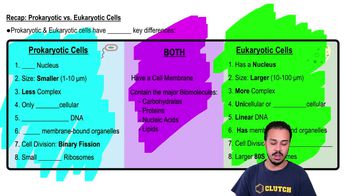Different proteins are composed of different sequences of ________.
a. Sugars
b. Lipids
c. Fats
d. Amino acids
e. Carbohydrates
 Verified step by step guidance
Verified step by step guidance



Different proteins are composed of different sequences of ________.
a. Sugars
b. Lipids
c. Fats
d. Amino acids
e. Carbohydrates
Proteins may function as ________.
a. Genetic material
b. Cholesterol molecules
c. Fat reserves
d. Enzymes
e. All of the above
A fat molecule consists of ________.
a. Carbohydrates and proteins.
b. Complex carbohydrates only.
c. Saturated oxygen atoms.
d. A carbon skeleton and fatty acids.
Which of the following lists the chemical bonds from weakest to strongest?
a. Hydrogen, covalent, ionic
b. Covalent, ionic, hydrogen
c. Ionic, covalent, hydrogen
d. Covalent, hydrogen, ionic
e. Hydrogen, ionic, covalent
Which of the following is not consistent with evolutionary theory?
a. All living organisms share a common ancestor.
b. The environment affects which organism survives to reproduce.
c. Natural selection always favors the same traits, regardless of environment.
d. Humans are not necessarily the best adapted organisms.